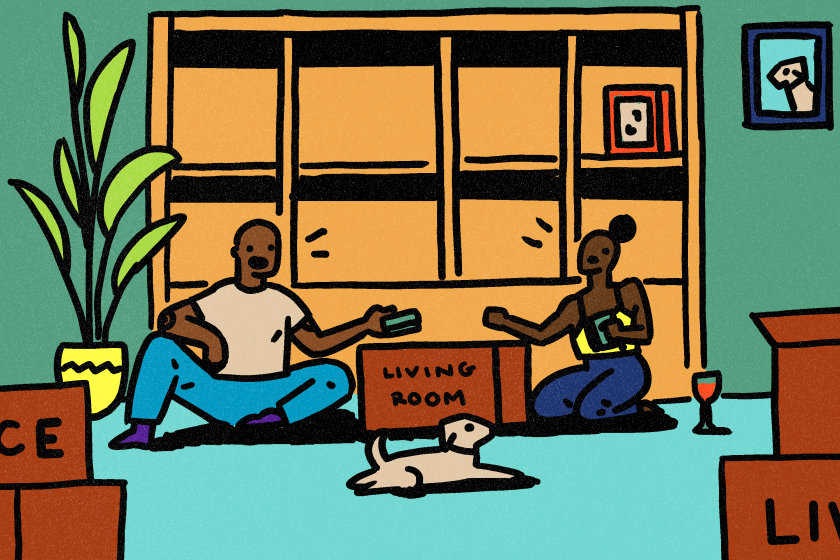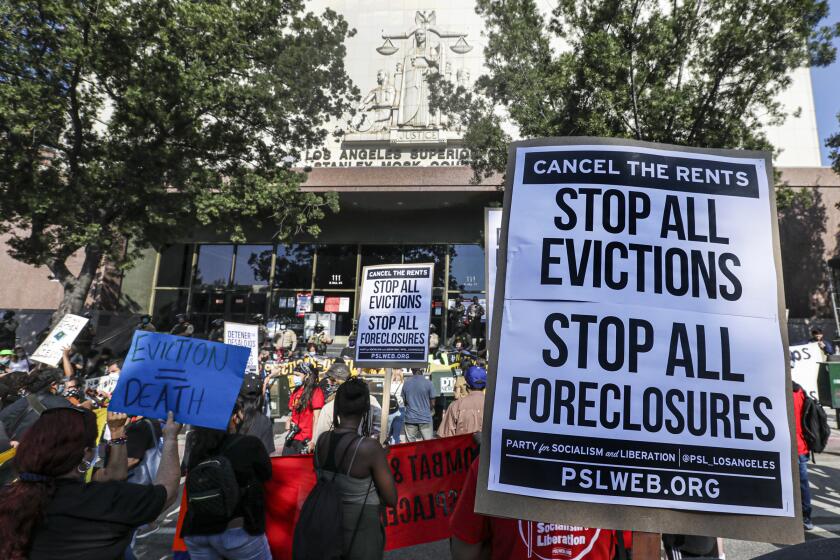How to get your security deposit back in California

- Share via
For all the mystery surrounding security deposits, California’s laws around them are fairly straightforward.
A security deposit is basically insurance for your landlord. He or she can use that money to clean the unit, repair damages or to make up for unpaid rent after you leave. But you, the tenant, have the legal right to clean and repair things ahead of time to ensure you get the full amount back.
After you move out, your landlord has 21 days to either return your security deposit or send you an itemized list of how much was kept and why, including receipts. If you don’t get your deposit back within 21 days, you can use a legal remediation program to sort it out, or sue your former landlord in small claims court.
Here’s an overview of what you can do before, during and after your tenancy to get as much of your security deposit back as possible, and what to do in case of a dispute with your landlord. (And if you want to cite the specific civil code, you can find the full text of the law here.)
Before you move in
In California, your landlord can charge the equivalent of up to two months’ rent as a security deposit on an unfurnished unit. If it’s furnished, the deposit can be up to three months’ worth. Your landlord cannot say the deposit is nonrefundable — you are entitled by law to get it back unless your landlord goes through certain steps to keep all or part of it.
Before you move a single box into your new place, take five minutes to get photos and video of how it looks. You’ll be able to refer to this when you move out to prove what condition the premises were in at the start of your tenancy. Take note of “every nook, cranny, crack and stain,” said Victoria Zacarias, the counseling and hotline coordinator for Tenants Together, an organization dedicated to California tenants’ rights.
You can find move-in checklists online or make your own. Zacarias recommends making a copy once you go through the list and sending it to your landlord via certified mail, so you have proof they received it.
Before you move out
Throughout your tenancy, keep a running document of your repair requests and the date your landlord fulfills them. If possible, make all maintenance requests by mail, text or email, so you have a written and dated record. Keep a copy of your lease in the cloud along with your move-in checklist.
State law does not require your landlord to pay you annual interest on your security deposit, but 15 cities in California do in some circumstances, including Los Angeles, West Hollywood, Beverly Hills and Santa Monica. Look up your city’s ordinance to see whether it requires interest and what the rate is. Your landlord is not required to keep your deposit in any kind of special or separate account; they owe you interest if your city requires it, regardless of whether they earned interest on it. (If you’ve moved out and are owed back interest, you can take your former landlord to small claims court for it.)
If your landlord sells the building where you live, your security deposit may be returned to you or transferred to the new owner, along with a letter stating the amount remaining after any lawful deductions and an itemization of any deductions made. If you sign a new lease with the new owner, make sure the correct amount of your security deposit is there in writing.
If you’re moving before your lease is up, you need to work out with your landlord whether you can break the lease early or find a subletter. If you move out before your lease is up without making some kind of arrangement with your landlord, or if they decline to let you break the lease early or sublet, they can keep your security deposit to make up for the unpaid rent.
California law says that when you know you’ll be moving out, you are entitled to request an inspection two weeks before you leave. But the burden is on you to request that from your landlord.
During the walk-through, the landlord will identify any needed repairs or cleaning. They must provide you with an itemized list. You have the final two weeks of your tenancy to repair or clean those things yourself or hire someone else to take care of it.
Moving often brings a lot of stress and anxiety. But local moving professionals explain how some extra planning can make your move day go smoothly.
After you move out
Ideally, at this point, you’ve done a walk-through with your landlord and have made all the repairs needed. If your landlord declined the walk-through, take a video of the unit to show what condition it’s in. Go through a move-out checklist and capture as much as possible to show that everything is clean and in working condition.
Once you and your boxes and furniture are gone, your landlord has to return your deposit within 21 days, under California law. (That’s three calendar weeks — not 21 business days.)
If you are not getting your full deposit back, you are entitled to know why and to get an itemized statement of what was repaired or cleaned and how much it cost. Receipts must be included if the cost was more than $125. Your landlord can bill you for parts and labor. If your landlord or their employee did the repairs or cleaning themselves, the statement must describe the work performed and include the time spent and the reasonable hourly rate charged. If the landlord intends to make a repair but cannot reasonably get it done within 21 days of you vacating the premises, they can deduct from your deposit if they provide a good-faith estimate of what the repair will cost, and send you the itemized statement within 14 days of when that repair was completed.
Your landlord can deduct from your security deposit for unpaid rent, cleaning fees and repairs to damages outside of normal wear and tear.
Here are some examples of things for which a landlord can deduct.
Cleaning fees
Your landlord can deduct from your deposit to restore the unit to the level of cleanliness it had when you moved in — not to spotlessness, unless that’s how you found it, said Heidi Palutke, the senior vice president of compliance and education for the California Apartment Assn., which represents property managers and landlords.
That’s where your documentation comes in. If you have your Day 1 photos and video and leave your apartment as clean as it was when you moved in, your landlord cannot keep any of the deposit for cleaning. You also have the option to clean it yourself after your things are moved out, or to hire outside cleaners.
Unpaid rent
If you owe back rent, it can be taken from your security deposit.
Damage
Normal wear and tear can’t be deducted from your security deposit. But if you damaged the unit beyond what would be expected from having a person live in it, it’s your financial responsibility. Cigarette burns or pet stains on the carpet, holes in the wall, ripped curtains — that’s on you.
Your landlord is responsible for the maintenance of the unit and the appliances that came with it. So the plumbing, the faucets, the A/C, the fridge. These things sometimes break on their own, and it’s your landlord’s job to fix them. But if you broke something through damage (for example, you tried to move some furniture and accidentally smashed the ceiling light) or negligence (you noticed a leaky pipe under the sink but never reported it, and now the floors are ruined), that’s your responsibility.
Here are some examples of things that cannot be deducted.
Wear and tear
“The basic concept is that some things, like carpeting and paint jobs, they don’t last forever,” Palutke said.
You would not expect carpet to still look like new after 10 years of being lived on.
The extent of what constitutes “wear and tear” is not fully defined in California law — there’s no statute that spells out precisely how many nicks in the wall are acceptable or what percentage of curtains may be faded from the sun. If you and your landlord do the pre-move-out walk-through, that’s an opportunity to clarify what they want fixed, and for you to potentially make your case that the smudge on the light switch does not merit a deduction.
Damages or defective conditions that predate your tenancy
Once again, this is where your Day 1 documentation pays off. If the tile in the bathroom was cracked before you unpacked your first box, repairing it is not your financial responsibility.
If you’re like most people in Southern California, you live in a rental.
My landlord never returned my security deposit. Now what?
What if you never get it back? Once the 21 days have elapsed, reach out to your landlord and let them know you’re aware of the law and that they owe you your security deposit.
If you’ve been fortunate enough to have a good relationship with your landlord, you can start with a friendly inquiry. I moved out of an apartment in West Hollywood in July 2020, giving my landlord about six weeks notice plus an opportunity to do a walk-through, which my landlord declined. I moved to my new place and, in October, realized that I’d never received my security deposit or heard from my landlord about repairs.
I sent a text message to the building manager: “Hi! I hope you’ve been well. I just wanted to inquire about our security deposit. We put down $1,600 when we moved in. Do you need my address so I can be mailed a check?” The building manager wrote me back that afternoon to apologize for the delay and asked for my new address so she could have the check sent.
For a more official route, you can send a letter via certified mail. Tenants Together offers a sample letter to request your security deposit back, as well as one to contest deductions.
If you try this and don’t hear back after 10 days — or suspect the process will not go smoothly — your next step is legal mediation or small claims court (if the amount is less than $10,000). You have up to four years after you move out to take your landlord to small claims court for a written lease; it’s two years if your agreement was oral only.
You can sue in small claims court for the amount of the security deposit plus twice the amount of the deposit in damages if the judge finds your landlord kept your deposit in bad faith. The amount it will cost you to file your case depends on how much you are suing for; expect to pay $30 to $75. Here’s how to file a small claims case in California.
You don’t need to hire a lawyer for small claims court, though you can seek out legal assistance through an attorney who specializes in landlord/tenant issues, or find assistance via the resource list on the Tenants Together website.
The full text of California’s security deposit law has more specifics on what the law requires of you and your landlord.
More to Read
Sign up for Essential California
The most important California stories and recommendations in your inbox every morning.
You may occasionally receive promotional content from the Los Angeles Times.










